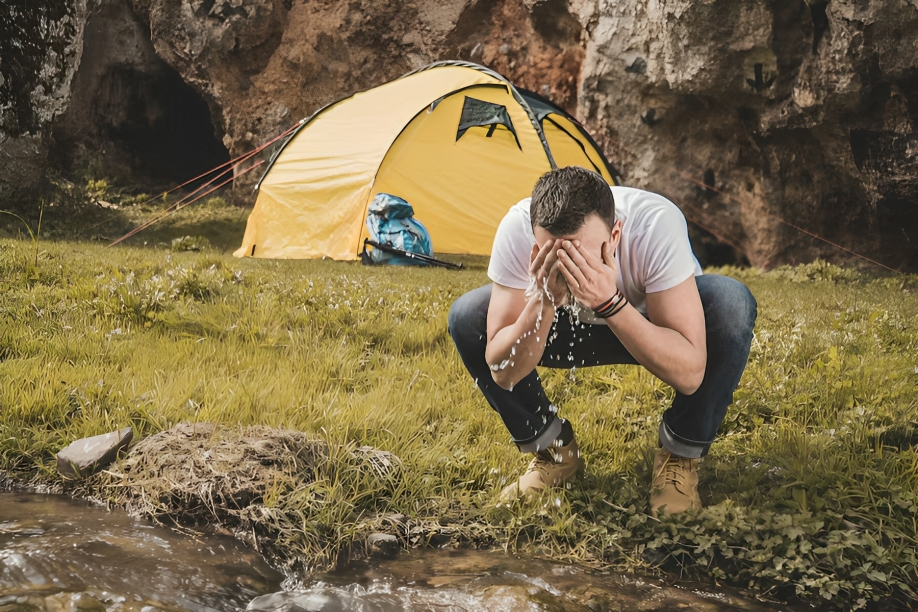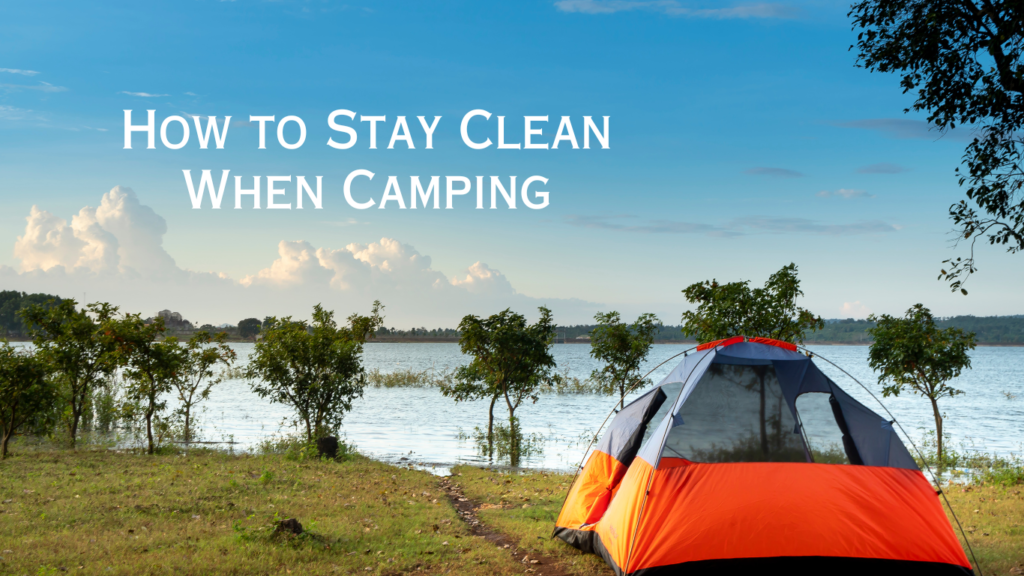Having good hygiene while camping and staying clean is difficult. Personal hygiene when camping reduce the chance of rashes, bacterial growth, and other things that cause a less pleasant camping trip. With these camping hygiene tips, we will help you to learn how to stay clean when camping and the importance of camping cleanliness.
TO THE POINT:
Stay clean when camping by packing essentials like biodegradable soap, toothpaste, and a toothbrush. Choose a campsite near clean water, use biodegradable wet wipes, and wear quick-drying clothes. Dispose of waste properly, consider dry shampoo, and camp away from water sources. Portable showers help, keep nails short, and stay hydrated.
Choose the Right Campsite
Selecting the right campsite can significantly impact your camping hygiene experience. Look for a location with access to clean water sources, such as rivers or lakes, where you bathe and wash your stuff. Avoid setting up camp near stagnant water or areas with a high concentration of wildlife, as these may attract insects and contribute to unsanitary conditions.
Camping Hygiene Essentials
Bring
- Hand sanitizer
- Biodegradable soap (all in one)
- Toothbrush and toothpaste
- Wash cloth
- Baby wipes or Body Wipes
- Toilet paper
Do Not Bring
- Deodorant (smells attract creatures)
- Mirrors
- Non biodegradable products (can harm environment)
How To Shower When Camping
Although taking a shower while camping is nothing like taking a shower in your home, it can be a luxury for camping, if done correctly.
Sponge Bath
You’ll require between 1 to 3 liters of water, a body sponge, and biodegradable soap. Find a private place for yourself and take off your clothes. Begin cleaning yourself with a wet soapy sponge or camping cloth. After that, use water to rinse away all the soap either by using your sponge or by splashing yourself with water. It’s now time to pat yourself dry with a dry towel.
Hot camping shower
One of the best ways to take a hot camping shower while camping is to use a solar shower. Fill it with water and place it out in the sun for about two to three houses before you plan on using it. When ready to take a shower hang it above your head on a tree or anything taller than you. Now you are ready to shower with warm water and biodegradable soap.
Nature shower
This is a very refreshing and cool way to shower in the wilderness. You use a lake, river, or flowing spring/waterfall. If you choose this option make sure to use biodegradable soap so you aren’t harming the environment.
READ ALSO: How to Build A Campfire The Right Way
I recommend a river or waterfall as they are flowing water making the water cleaner and easier to rinse off your soap.
Baby wipes
This may not be people’s favorite but it is quick and efficient and works well if it is one of your only options. All you need is bay wiped or body wipes. You can clean your entire body with wipes but I recommend to focus the use of your wipes on what you want the cleanest or the dirtiest parts of your body.
Can I use natural remedies for camping hygiene?
Yes, you can use some natural remedies while camping hygiene. For example, lemon juice can act as a natural deodorant and baking soda can be used as a toothpaste or dry shampoo. Here are some more alternative natural remedies and tips for camping hygiene:
- Hand Sanitizer: You can make a natural hand sanitizer using aloe vera gel and essential oils with antibacterial properties, such as tea tree oil or lavender oil.
- Feminine Hygiene: Menstrual cups and reusable cloth pads are eco-friendly alternatives to disposable feminine hygiene products. They are easy to clean while camping.
- Insect Repellent: Essential oils like citronella, lavender, and eucalyptus can be mixed with a carrier oil like coconut oil to create a natural insect repellent. Be sure to research the specific oils that are effective against the insects in your camping area.
- Hydration: Staying hydrated is crucial for hygiene. You can use a water filter or purification tablets to ensure access to clean drinking water from natural sources.
- Natural Cleansers: Lemon juice, vinegar, and baking soda can be used for cleaning dishes, cookware, and even your body in a pinch.
- Personal Hygiene Products: Look for eco-friendly and biodegradable personal hygiene products, such as biodegradable toilet paper and bamboo toothbrushes.
While natural remedies can be effective for camping hygiene, it’s important to ensure they are safe and suitable for your specific needs and camping conditions. Always do your research and consider factors like the environment, local regulations, and personal preferences when choosing natural alternatives for camping hygiene.

How Wash Dishes When Camping
With no running water dishes can sometimes be a challenge but with this system it can make doing your dishes easier and more efficient.
You will need three “sinks” whether these are portable camping sinks or any types of plastic tubs that will fit your camping dishware. Along with a sponge or brush that will scrub off food, biodegradable soap, bleach, a strainer to remove food chunks, and a drying cloth/towel
To prep you clean, set up start to boil enough water to fill each bucket with enough to cover your largest dish. Once the water is boiling put an equal amount of hot/boiling water in each tub. The fist tub/wash tub consists of hot water and a squirt of biodegradable soap. Second tub/rinse tub is strictly hot water. Your last tub/sanitizing tub is a small splash(about 2 teaspoons per 1 gallon) of bleach or your dish sanitizer.
You will begin with scraping as much off your plates and utensils into the trash. Place dishes in your wash tube and let them soak for a few minutes and scrub off one at a time until the dish is clean. Place into a rinse tub and swish them around the hot water to get rid of the soap. Then shortly soak in the sanitizer tub to make sure dishes are completely clean and disinfected. Lastly dry off with a viable dish rag which should be very absorbent.
Once dishes are complete you will need to dispose of everything to keep the environment clean. You will need to strain each cleaning tub to get rid of all food scraps and other waste that should go into the trash. Then you will dispose of the gray water from each of the tubs. If possible, dispose of all gray water into a drain; Otherwise make sure you are a few hundred feet away from any water source and dump your water over a large area.
Camping Hygiene: (FAQs)
Takeaways
There are many different ways of taking a shower while camping and all depends on your preferences and what resources you have accessible to you. Taking a hot shower while camping can be a huge moral boost during your trip and prevent other things from becoming dirty like your tent or sleeping bag.
Washing your dishes by hand is never fun but very essential while camping since you have to continue to reuse the same dishware throughout a camping trip. With the proper system and some help full hands you can get through it very easily with clean disinfected dishes.
Having good hygiene when camping can be difficult at times but once you have a quality system it makes it a lot easier. One of the biggest things you can do to limit your harmful effect on the environment is using biodegradable soap and products in everything you do outdoors.

Fantastic perspective! The points you made are thought-provoking. For more information, I found this resource useful: FIND OUT MORE. What do others think about this?